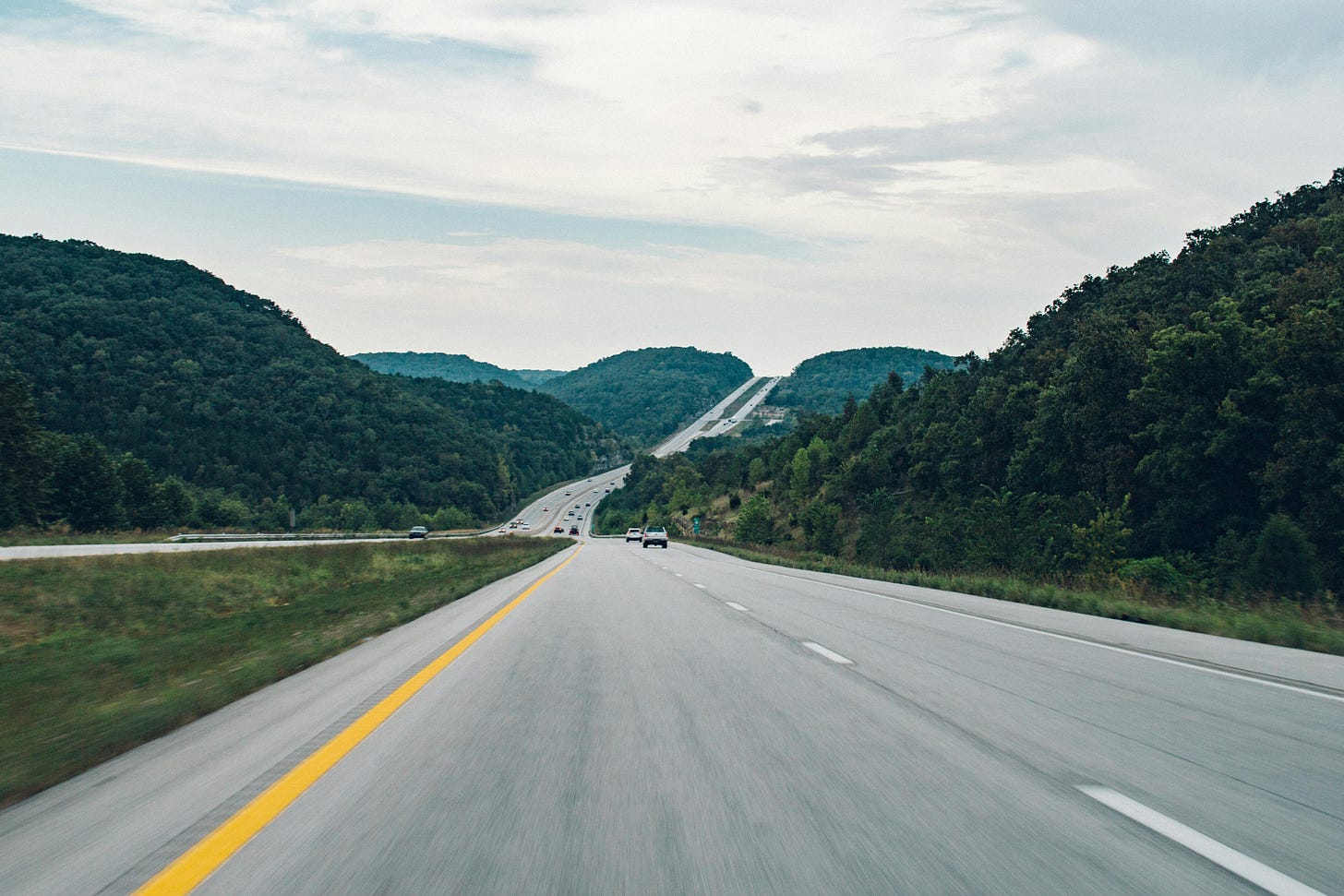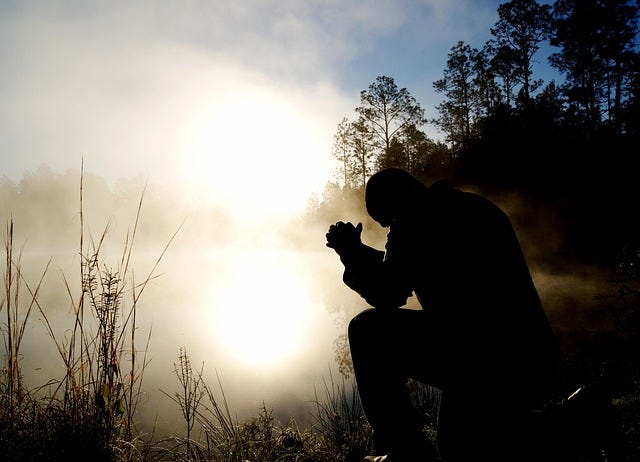Roadtrip
Do not be anxious about tomorrow, for tomorrow will be anxious for itself.
This year, the Fourth of July holiday weekend involved a road trip to South Carolina to visit my mother-in-law. We left early on the morning of the 4th to get there in time for dinner. Our extended cab pickup truck had ample room for two men over 6 feet tall, my wife, and the two dogs. The luggage spent the trip in the truck bed! The anticipated length of the drive was seven hours.
After we got past the first cup of coffee and small talk, I decided to listen to a podcast. That lasted about an hour, until the person being interviewed started talking about psychedelic drugs and the demons that would appear to him when he was taking his “medical trip.” No thank you. Having lost interest in podcasts for the time being, my son decided to play music.
After a couple of false starts, he decided to start playing silly music. The first was the “chicken polka.” It was so ridiculous it was funny. Another song in particular made me laugh pretty hard—the Oktoberfest version of “In Heaven there is no beer.” (I have embedded a version of the song at the bottom of this post if you want to listen.)
While the song itself is amusing, the music brought to mind visits to beer gardens in Germany—a fond memory of times before my gluten allergy! The lyrics go like this:
In Heaven there is no beer
That's why we drink it here
And when we're gone from here
Our friends will be drinking all our beer.
The musical interlude and laughter did not last very long unfortunately. Hours of driving remained ahead of us.
I have taken this drive probably a hundred times since I met my wife. The current route is not the same because we now live in a different part of Northern Virginia. Nevertheless, we have been taking the new route for years. The routine has become familiar. Traffic in Charlottesville. Mountains and hills. Stretches with a 70 mile per hour speed limit. We know where Joe Bean’s coffee shop is. We know where the Bojangles “oasis” is. After all of that, the 6-lane stretch of I-85 north of Charlotte is always hectic. And then the final stretch into rural South Carolina.
I have started to notice, however, that at my age and with my personality a 7-hour road trip is a challenge. The biggest problem I have with a long road trip is my “Type A” personality. I want to get to the destination—that is the objective. As a result, I tend to focus throughout the drive on getting to the destination as quickly as possible. What is the next marker of progress? Are we there yet? This mindset leads to me not focus on the journey itself.
[Full disclosure: I am not completely oblivious to my surroundings. I did notice the disturbing “Gummies for Granny” billboards in Charlotte, advertising marijuana gummies with a picture of a sunglasses wearing grandmother who appears to be having the time of her life.]
This understanding about myself became more clear when I started thinking about drafting this article. I have recognized in other aspects of my life how this mentality affects my approach to things. For example, as a young lawyer I had difficulty with litigation because of the long time horizon for cases to unfold and reach a resolution. A lawsuit can take years to work its way through the process. The courts do not move quickly. And even when a case does make it to a jury trial, the loser can file an appeal and drag the case on for a couple more years. I struggled for a long time over patience with the process.
At some point, I figured out that being so focused on reaching the final outcome in a case was not the best approach. I found that it actually induced an increase in anxiety in me as I fretted about not being able to bring the case to an end. Instead, I began to focus on the process. What should I be doing right now to move the case forward and hopefully improve our position in the case? Adopting a process-based approach instead of an outcome-based approach allowed me to feel like I was accomplishing something in each of the little tasks I completed along the way.
Not surprisingly, this same principle applies to the spiritual life. In my youthful “first fervor” I was focused on “becoming a saint.” There were prayers and devotions that I felt I needed to say in order to be on the right path. I had to prove myself with fasting and vigils. I devoured book after book on the Church, the liturgy, lives of the saints, spiritual warfare, healing prayer and mystical theology. “I” was doing as much as I could do in order to “become a saint.”
My spiritual director at the time recognized the “Type A” personality at work in me and how it was playing into my spiritual life. Much of the advice he gave me was intended to help me live more in the present moment spiritually, and not be focused so much on “the goal.” In other words, he advised that I should focus more on being present with Jesus in my prayer time and focus less on doing things or checking things off my spiritual list. Admittedly, I failed to work on some of the things he recommended until later in life. After years of experience and learning the hard way that I could not “become a saint” by sheer willpower and effort, I have been able to live more in the present moment.
In the school of hard knocks, I have also learned to “embrace the process” in many dimensions of the spiritual life. Whether it is simply seeking spiritual growth, trying to overcome sin or enduring the process of deliverance from the unwanted influence and residual effect of the enemy in my life, I have discovered that it is all a process. The spiritual life is a process. The important thing is to keep moving forward with Jesus.
The one thing that is absolutely required in order to move forward with Jesus is prayer. We must make a commitment to daily prayer. Our daily prayer time with the Lord opens us to His grace and leads to healing, deliverance and spiritual growth.
The process of the spiritual life only comes to an end upon our death. Until that time, we should be doing everything in our power to cooperate with the grace of God, recognizing that ultimately it is the power of the Holy Spirit that will transform our lives. But we have to cooperate—God will not force His love upon us. The first step is to set aside time every day for prayer.
Just this week, I read an article by David Torkington on prayer that fits here:
Learning to Pray needs Practice
Learning to pray, learning to open ourselves to God, is like anything else: it needs practice and it takes time. There is no accomplishment of any worth that I know of that you can attain merely by desiring to have it. We think nothing of spending hours a day and working for years to get a degree, pass an examination, or attain certain qualifications, and we quite rightly accept as a matter of course that the time we give and the energy we expend is necessary. Somehow we seem to think that prayer is an exception, but believe me, it is not. . . . What right have we to imagine that prayer is an exception to the rule. We are supposed to be dedicated to the mastery of the art of arts and at best we drift aimlessly along like half-baked amateurs dabbling in something that demands the full potential of the professional.
The Oasis will become a Fountain
If we are only prepared to give the same daily time to prayer that would be required to reach a fairly reputable standard on the piano, then, in time, our lives will be dramatically and irrevocably changed. We may start with ten minutes a day and gradually extend that period as we master the preliminaries. But as the months go by, the period will gradually extend so that in the end the problem will be to restrain rather than prescribe a minimum time. If all goes well, the prayer that starts and develops at set times ought to gradually filter through into the rest of the day. In the end, it will become co-extensive with all and everything we do. To begin with, the prayer period will be like a desert, dry, arid and barren. But it will eventually become an oasis in our lives that we cannot do without. However, that is not the end. It is only the beginning. In the end, the oasis will become a fountain that will well up and brim over to irrigate the whole of our lives, as ‘the prayer without ceasing’ transforms our daily spiritual lives enabling us to say with him, ‘It is no longer I who live, but it is Christ who lives in me’.
Learning to Pray Takes Time and Practice, David Torkington
My recommendation is to take some time today to sit with the Lord Jesus and let Him love you.
Do Not Worry
“Therefore I tell you, do not be anxious about your life, what you shall eat or what you shall drink, nor about your body, what you shall put on. Is not life more than food, and the body more than clothing? Look at the birds of the air: they neither sow nor reap nor gather into barns, and yet your heavenly Father feeds them. Are you not of more value than they? And which of you by being anxious can add one cubit to his span of life? And why are you anxious about clothing? Consider the lilies of the field, how they grow; they neither toil nor spin; yet I tell you, even Solomon in all his glory was not arrayed like one of these. But if God so clothes the grass of the field, which today is alive and tomorrow is thrown into the oven, will he not much more clothe you, O men of little faith? Therefore do not be anxious, saying, ‘What shall we eat?’ or ‘What shall we drink?’ or ‘What shall we wear?’ For the Gentiles seek all these things; and your heavenly Father knows that you need them all. But seek first his kingdom and his righteousness, and all these things shall be yours as well.
“Therefore do not be anxious about tomorrow, for tomorrow will be anxious for itself. Let the day’s own trouble be sufficient for the day.1
Eric A. Welter is an employment lawyer and trial attorney with a long-time devotion to intercessory prayer. He is a Catholic Christian who has been involved with intercessory and healing prayer ministry for over twenty years.
Matthew 6:25-34 (RSV-CE).



